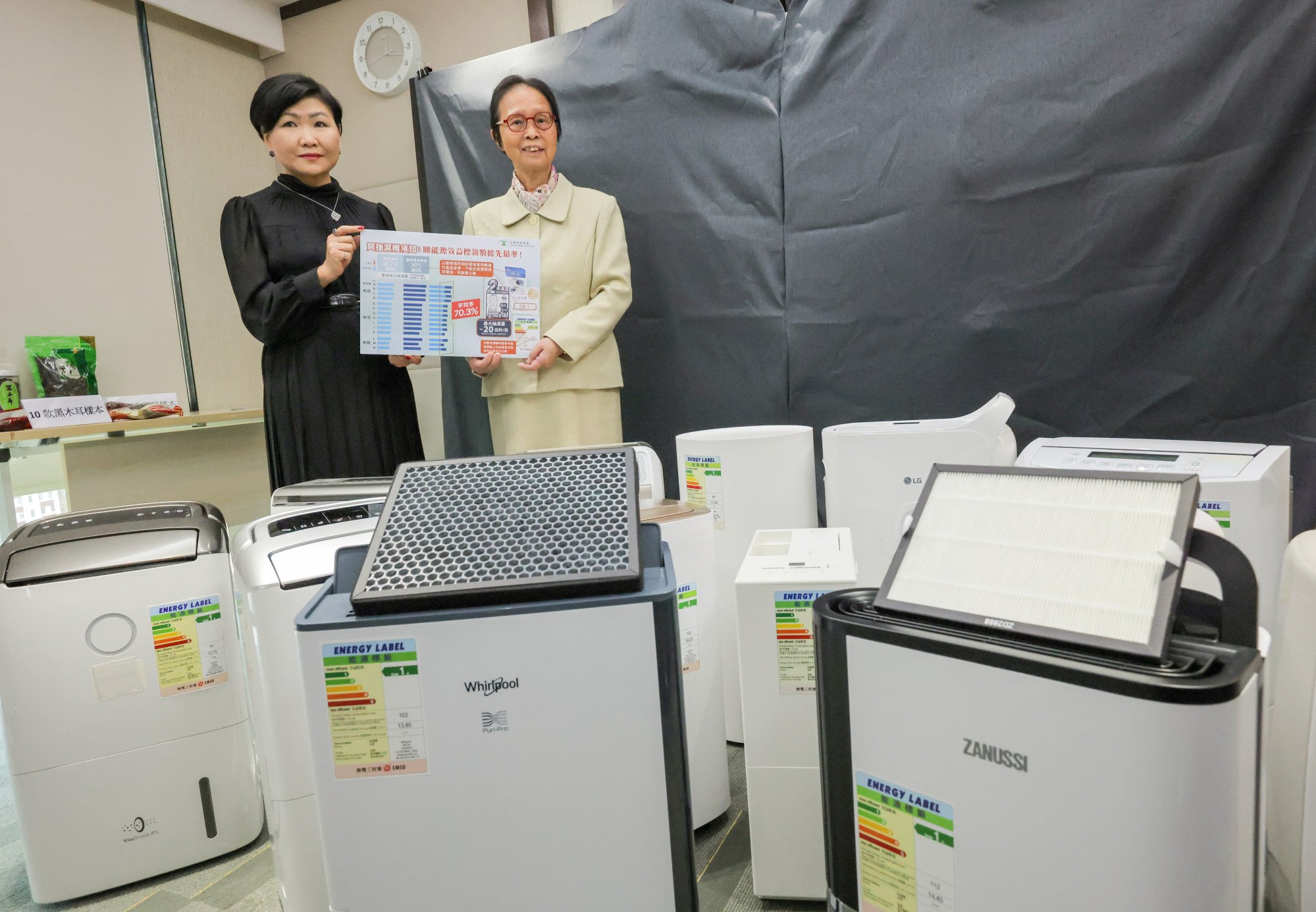
Hot air or unfiltered truth? Hong Kong consumer watchdog finds 2 dehumidifier brands overpromised and underdelivered
- Two out of 14 models tested failed to perform at the capacity claimed by the manufacturers during a recent test
- Watchdog advises consumers to consider filter replacement costs before buying a dehumidifier
As spring approaches bringing Hong Kong’s characteristic humidity, the city’s consumer watchdog urged residents to be extra careful when buying dehumidifiers after it found two out of 14 models failed to perform at the capacity claimed by the manufacturers during a recent test.
The two models – both equipped with high-efficiency particulate air (HEPA) filters – failed to meet the dehumidifying capacity and energy efficiency claims, which might lead to consumers paying higher electricity fees, the Consumer Council said on Wednesday.
A total of 14 models of dehumidifiers were tested under two different environments, namely a standard test with 26.7 degrees Celsius (80 Fahrenheit) and 60 per cent relative humidity, as well as the manufacturers’ setting with 30 degrees and 80 per cent relative humidity.
The devices tested included four two-in-one air-purifying models ranging from HK$3,990 (US$508) to HK$6,180 with HEPA filters – and 10 conventional versions ranging from HK$2,099 to HK$6,080.

The council found the daily capacity of a Whirlpool and a Zanussi dehumidifier installed with HEPA filters was about 13.2 per cent and 23.1 per cent, respectively, lower than they claimed in the standard test.
The daily dehumidification capacity for both samples under the manufacturers’ environment was also about 14.7 per cent and 41 per cent, respectively, lower than they claimed.
The two models, however, were close to their claim without the filter.
Nora Tam Fung-yee, chairwoman of the council’s research and testing committee, said both samples were marked with a grade 1 rating on the energy label but dropped to grade 2 and 4, respectively, based on their energy factor after installing HEPA filters.
A product with a grade 1 energy label is among the most energy-efficient on the market, and one with a grade 5 is the worst, according to the government’s Mandatory Energy Efficiency Labelling Scheme (MEELS), which aims to help the public to choose energy-efficient products.
“The manufacturers of these two models could potentially mislead consumers into believing that the dehumidifying performance of these two models was comparable to that of other dehumidifiers which have obtained a grade 1 energy label,” Tam said.
The test results were passed to the Electrical and Mechanical Services Department (EMSD) and customs. The department also found that the two models tested under the standard environment failed to comply with the MEELS’s requirement via tests conducted by a third-party independent laboratory.
It added the reference number of the concerned model could be removed, and any product found to be non-compliant could not be sold in Hong Kong.
The Customs and Excise Department said it would investigate the council’s result and take appropriate enforcement actions if the related products were found to be violating the trade descriptions ordinance.
Zanussi replied to the council’s inquiries, saying there was no need to install a HEPA filter according to the manual. The filter which came with the product was a gift.
The Post has reached out to Whirlpool for comments.
The council also looked into the four two-in-one air-purifying models by testing the removal of cigarette smoke, dust and pollen referencing the United States’ national standards.
The results showed the model with the highest and lowest air purifying speed in removing smoke, dust and pollen varied by 2.3 times, 1.8 times and 1.7 times, respectively.
The watchdog also advised consumers to consider the cost of filter replacement before buying a dehumidifier.
It said the approximate cumulative costs for replacing filters were estimated to range from zero to HK$2,000 for the first five years among all models tested and HK$350 to HK$4,000 for the first 10 years.
“However, the actual frequency of replacing filters is subject to conditions of use. For example, if there are more indoor pollutants or the dehumidifier operates for longer periods, filters might require replacement more frequently, and the cost would be higher,” Tam said.

